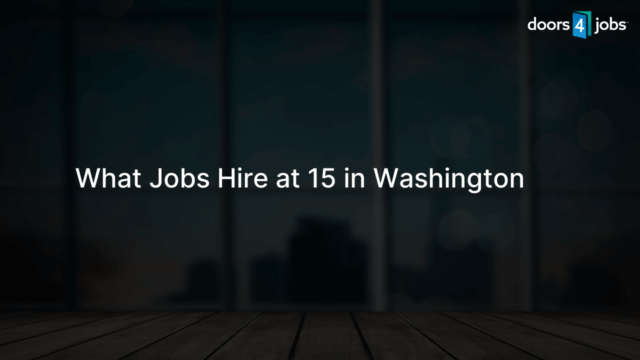Yes, for most summer jobs, you need a work permit, especially if you’re under 18 or a foreigner. Work permits ensure legal employment and protect both employees and employers. Depending on your location, the rules may vary, so it’s essential to check your local laws and requirements.
Work Permit Requirements for Summer Jobs
When considering whether you need a work permit for a summer job, it is essential to take into account different factors such as age, citizenship, and location. Work permits help ensure legal employment and protect the rights and safety of employers and employees. This guide is an overview of work permit requirements for summer jobs.
Factors Affecting Work Permit
Age
Many countries have child labor laws in place that mandate work permits for minors to ensure compliance with child labor standards. If you’re under 18, the chances are that you’ll need a work permit before securing a summer job. While the exact age requirements may vary, please consult the labor laws in your jurisdiction for the most accurate information.
Citizenship
If you are a foreigner planning to work a summer job in another country, you are most likely required to have a work permit. This rule applies even if you’ll be working for only a few months. To obtain a work permit, ensure that you meet the criteria and complete the necessary paperwork in advance.
Employment Industry
Work permits may not be needed for all industries. For example, some countries might not require permits for certain jobs, such as internships or volunteer work. Others may consider the type of work, hours, and pay. Make sure to look into the specific requirements for your chosen industry.
Applying for a Work Permit
Application processes for work permits differ depending on the issuing authorities and the country. In general, applications require an employer’s offer, proof of eligibility, identification, and sometimes medical clearance. Keep in mind that each jurisdiction may have specific application deadlines, fees, or additional documents to submit.
Additional Tips and Considerations
Research Your Local Laws
The rules and regulations governing work permits vary, so it’s crucial to consult your local labor laws and requirements. This information can typically be found through government websites or local labor offices.
Plan Ahead
Processing times for work permits can be lengthy, so it is best to apply for the permit as soon as possible. Ensure that you have all the necessary documents and gather the required information to avoid any delays or complications in the application process.
Consult an Expert
If you are unsure about any aspects of your work permit application, it may be helpful to consult a legal expert familiar with the regulations and requirements in your country. They can provide guidance and help ensure that your application is successful.
Possible Exceptions for Work Permit Requirements
There could be some exceptions to the work permit requirement based on the type of employment, personal situations, or specific programs. However, exceptions depend on the jurisdiction, so it’s vital to verify your local rules.
Family Businesses
In certain jurisdictions, minors working in a family-owned business may not need a work permit. Nevertheless, certain restrictions may still apply, such as limitations on the type of work and the number of hours a minor can work. Check your local labor laws for specific rules regarding family businesses.
Student Exchange Programs
Individuals participating in student exchange programs might be allowed to work without a work permit for a short duration. There are specific rules governing such programs, so it’s crucial to understand the conditions of your student exchange and see if a work permit is still required.
Agricultural Work
In some cases, if you’re looking for a summer job in agriculture, certain jurisdictions may have different or more lenient laws regarding work permits. However, restrictions and regulations might still apply to protect workers’ rights and safety.
Maintaining Compliance with Work Permit Regulations
Both employees and employers have a responsibility to ensure that work permit regulations are followed. Violating labor laws can result in fines, penalties, or even legal action, so it is crucial to stay compliant.
Employees’ Responsibilities
Employees should ensure that they obtain the necessary work permits and provide accurate information on their applications. They must respect the terms and conditions of their work permits, including work hours, employer, and job position. It is vital to notify the relevant authorities if any changes occur during employment that might affect the status of the work permit.
Employers’ Responsibilities
Employers must verify that all hired employees have the required work permits and maintain accurate employee records. Employers should also comply with the restrictions and regulations on hiring minors and foreign workers. Additionally, they must inform the relevant authorities in case of changes in the employment status that may affect the employees’ work permits.
Renewing or Changing Work Permits
If you plan to work multiple summer jobs, you might be required to obtain a separate work permit for each employer or to renew the permit upon expiration. Moreover, if you switch jobs or employers, it may be necessary to apply for a new work permit. It is essential to be aware of the process and requirements for renewing or changing work permits in your jurisdiction.
FAQ Section
Below are some frequently asked questions and their direct answers related to work permits for summer jobs. This section aims to provide concise and useful information to help you navigate your work permit needs for summer employment.
Do all minors need a work permit for a summer job?
Generally, yes, most minors under 18 need a work permit for a summer job. However, rules may vary depending on your location, so it’s important to check your local labor laws for specific age-related requirements and possible exceptions.
Do I need to get a new work permit for each summer job I take?
Yes, typically you need a separate work permit for each employer or job. Additionally, if you switch jobs or employers, you may need to apply for a new work permit. Be sure to understand the process and requirements for your jurisdiction in such cases.
How long does it take to obtain a work permit?
Processing times for work permits vary depending on the jurisdiction and issuing authorities. It may take anywhere from a few days to several weeks. To avoid delays, apply for a work permit as soon as you receive a job offer and ensure you have all necessary documents and information.
What happens if I work without a work permit?
Working without a work permit may result in fines, penalties, or legal consequences for both employees and employers. Ensuring compliance with work permit requirements protects all parties involved and reduces risks related to labor law violations.
Is a work permit required for unpaid internships or volunteer work?
Work permit requirements for unpaid internships or volunteer work depend on the jurisdiction and type of work involved. In some cases, permits may not be necessary, while others might have specific rules regarding unpaid positions. Consult your local labor laws to determine the proper course of action.











